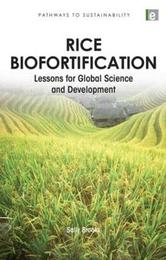
|
Rice Biofortification: Lessons for Global Science and Development
Paperback
Main Details
| Title |
Rice Biofortification: Lessons for Global Science and Development
|
| Authors and Contributors |
By (author) Sally Brooks
|
| Series | Pathways to Sustainability Series |
|---|
| Physical Properties |
| Format:Paperback | | Pages:192 | | Dimensions(mm): Height 234,Width 156 |
|
| Category/Genre | Biotechnology |
|---|
| ISBN/Barcode |
9781849711005
|
| Classifications | Dewey:633.1823 |
|---|
| Audience | | General | | Tertiary Education (US: College) | |
|---|
| Illustrations |
Photographs, index
|
|
Publishing Details |
| Publisher |
Taylor & Francis Ltd
|
| Imprint |
Earthscan Ltd
|
| Publication Date |
18 June 2010 |
| Publication Country |
United Kingdom
|
Description
Biofortification - the enrichment of staple food crops with essential micronutrients - has been heralded as a uniquely sustainable solution to the problem of micronutrient deficiency or 'hidden hunger'. Considerable attention and resources are being directed towards the biofortification of rice - the world's most important food crop. Through an in-depth analysis of international rice biofortification efforts across the US, Philippines and China, this book provides an important critique of such goal-oriented, top-down approaches. These approaches, the author argues, exemplify a model of global, 'public goods' science that is emerging within complex, international research networks. It provides vital lessons for those researching and making decisions about science and research policy, showing that if this model becomes entrenched, it is likely to channel resources towards the search for 'silver bullet' solutions at the expense of more incremental approaches that respond to locality, diversity and the complex and uncertain interactions between people and their environments. The author proposes a series of key changes to institutions and practices that might allow more context-responsive alternatives to emerge. These issues are particularly important now as increasing concerns over food security are leading donors and policy makers to commit to ambitious visions of 'impact at scale' - visions which may never become a reality and may preclude more effective pathways from being pursued. Published in association with the Economic and Social Research Council (ESRC)
Author Biography
Sally Brooks has held various roles in international development as a researcher and practitioner. She has a PhD from the Institute of Development Studies (IDS) and is a research officer with the STEPS Centre, Sussex. Her research focuses on the social and institutional dynamics of science policy processes in food and agriculture.
Reviews'A deeply thought-provoking book, this study of biofortification in rice explores how and why public science so often irons out complex needs into a demand for pre-packaged solutions. Biofortification could yet become an exemplar of a different, boundary-crossing, socially-informed science for poverty alleviation. [This] book is essential reading for both critics and proponents of biotechnology in international development.' Paul Richards, Professor of Technology and Agrarian Development, Wageningen University, The Netherlands 'A lucid analysis of the decision making in international agricultural research which emphasizes a technical, commercial approach. Malnutrition is far better tackled with a biodiversity approach that makes available local foods that can be eaten fresh and are free.' Suman Sahai, Convenor, Gene Campaign, New Delhi 'A deeply thought-provoking book, this study of biofortification in rice explores how and why public science so often irons out complex needs into a demand for pre-packaged solutions. Are the great private philanthropic foundations and the brilliant scientists they fund simply incapable of understanding the lives of the rural poor? The author prefers instead to make a case for deep institutional reform, offering space for new types of partnership. Biofortification could yet become an exemplar of a different, boundary-crossing, socially-informed science for poverty alleviation. Her book is essential reading for both critics and proponents of biotechnology in international development.' Paul Richards, Professor of Technology and Agrarian Development, Wageningen University, The Netherlands 'Rice Biofortification convincingly illustrates the tenacity of the top down linear research paradigm which unfortunately still dominates the international agricultural research agenda. How researchers can effectively work with local contexts is an important issue, which the author handles admirably.' Joachim Voss, independent research professional, and formerly Director General of the International Centre for Tropical Agriculture (CIAT), Cali, Colombia 'Rice Biofortification would be useful for both critics and proponents of biotechnology.' Greenteacher.org, CEE (Centre for Environment Education) 'A book for those formulating and appraising scientific research and its impact on social development.' New Agriculturalist 'The issues related to the organisation of public science and research highlighted in the book are very relevant in the context of the recent debates in India related to the commerical release of Bt Brinjal.' GreenTeacher.org
|